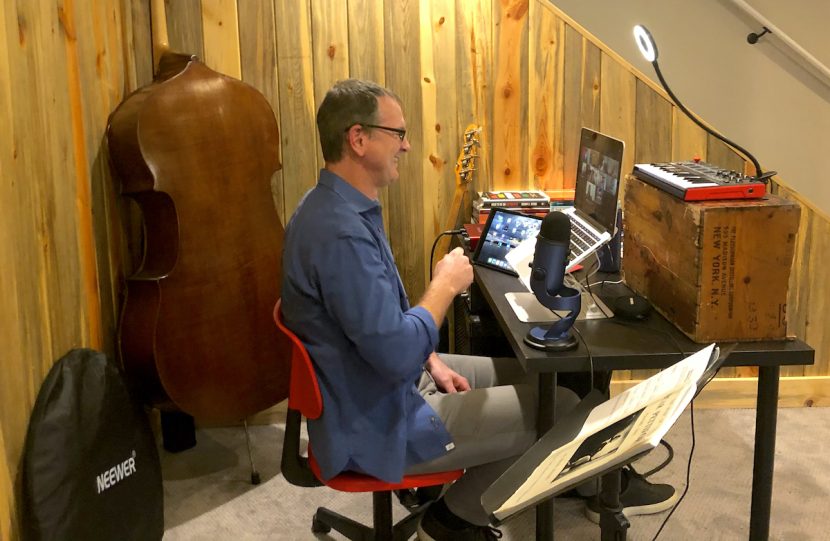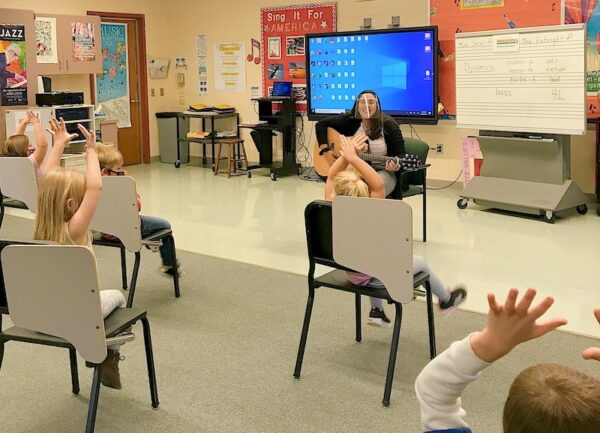By Barbra Weidlein
The impact of Covid-19 on teaching music continues to shed light on critical skills college music education majors need for their future careers. Many schools of music are reimagining their curricula to prepare students for a different teaching environment than the one that existed before the pandemic hit.
While this continues to be an ever-changing landscape, we asked a number of college-level music education professors and other music educators to offer insights on what prospective and current music education majors might expect.
New skills in the curriculum
Technology was already a key component of college music education programs prior to schools being shuttered by Covid-19. As the pandemic continues to challenge the educational process, music ed majors will need to continue to acquire additional tools being created for online teaching.
Music ed majors not previously familiar with online digital audio workstations (DAWS) such as Soundtrap and Bandlab have been introduced to them as valuable tools for teaching K-12 students, says Bryan Powell, assistant professor of Music Technology/Education at Montclair State University and strategist of Higher Education Initiatives at Little Kids Rock.
“By integrating pedagogical frameworks such as Technological Pedagogical and Content Knowledge (TPACK),” offers former high school band director and bassist Steve Holley, “all music educators – preservice and inservice – can better understand how to blend their deep knowledge of content and pedagogy with how to deliver this through the appropriate technological route.” Holley, now a PhD student in Music Learning and Teaching at Arizona State University, adds, “This is not tech for tech’s sake. It’s using 21st century tools to teach 21st century students.”
“Many programs incorporate technology, online resources, sound production elements and the use of advancing technologies,” says Darrin Thornton, Music Education professor and Interim Associate Dean for Academic Affairs and Outreach at Penn State School of Music. “I anticipate an added focus on the social context in which music is made in our culture and beyond our culture. This will add agency to music educators to address, through music, the social concerns of their current time and the role music has played in expressing concerns of past times.”
Music educator, author and consultant Lori Schwartz Reichl urges music education majors to be sure to become well versed in using learning management systems (LMS) for a multitude of purposes including viewing and sharing content, tracking student work, planning, and implementing and assessing specific learning processes. She specifically points to Canvas, Moodle, and Schoology as useful LMS. “Music education majors should be able to maneuver through these systems and feel comfortable using them to manage and organize online educational materials in addition to being confident conducting online courses with them,” she says.
In addition to technology, Reichl urges education majors “ to take an introduction to administration course. The ability to comprehend the numerous responsibilities and best practices a school-based administrator, such as a principal, must complete on a daily basis is crucial for effective communication and collaboration.”
Social and emotional challenges
The pandemic’s effect on schools and so many other aspects of daily life has magnified things that work and don’t work, reflects Jenny Neff, former department chair of Music Education at University of the Arts. Social and emotional challenges have hit students really hard. Teachers have already been experiencing the impact on their students. They have already needed new skills for dealing with these challenges in remote and hybrid teaching – and certainly in anticipation of students returning fully to in-person learning.
CASEL, the Collaborative for Academic, Social and Emotional Learning, defines Social Emotional Learning or SEL as “the process through which all young people and adults acquire and apply the knowledge, skills, and attitudes to develop healthy identities, manage emotions and achieve personal and collective goals, feel and show empathy for others, establish and maintain supportive relationships, and make responsible and caring decisions.”
According to Scott Edgar, chair of the Department of Music at Lake Forest College who has made SEL a major focus in his teaching and writing, SEL skills are geared toward providing students with the tools needed for confronting challenges. Self-awareness, social-awareness, and responsible decision-making are key elements. Music teachers can integrate SEL into the curriculum – “MSEL” – to create a more powerful learning experience for students.
Changes in the job market and hiring practices
No one can accurately predict the impact of the pandemic on the future of music education jobs. For the past several years, many schools of music education touted their 100% employment rates for new graduates. How this will change is anyone’s guess. And it will vary school district by school district.
“Some will actually need more teachers to support smaller groupings and/or online parallel offerings, and will likely replace any vacancies. But for most I think hiring may freeze as they repurpose music positions for other teaching professionals that are needed to deliver multiple modes of instruction,” says Penn State’s Darrin Thornton.
All of the music educators and professors interviewed for this article agree that there are some key things music education majors can do to improve their chances for landing a job.
• Become as versatile as possible – The more skills you have, and the more flexible you are especially about the location of where you may teach, the greater your chances of finding a job. There may be more demands of music teachers along with more responsibilities to take on, so be sure to find out how you’ll need to prepare before it’s time to start applying.
• Go beyond what’s expected – “The student who does more than the minimum is going to be better prepared and therefore more competitive in any job marketplace, no matter what that marketplace ends up looking like,” says David Rickels, chair of Music Education at University of Colorado Boulder College of Music. “Look for the extra opportunities to gain experience, whether through volunteering in a school or program, signing up for a leadership role in student groups, or even just asking questions and being an active participant in classes instead of passively waiting for information to come to you.”
• Deepen your knowledge and understanding of diversity, equity and inclusion in music education – In response to the protests that have taken place since the pandemic hit, “Applicants will likely need to express their stance, views, or philosophies on diversity, equity, inclusion and access much like the teaching philosophy question currently functions in common interview protocols,” says Thornton. “At the very least, applicants should consider the ways standard practices inhibit access and how they might mitigate those obstacles from within their own sphere of influence.”
• Stay current – on new technology, blended learning, trends around safe rehearsing, antiracist education. As a student of music education and as a future music educator, you can’t wait for information to come to you – you must actively seek it.
• Join professional music education organizations – Consider joining student chapters of NAfME (National Association for Music Education), ACDA (American Choral Directors Association), ASTA (American String Teachers Association), and NATS (National Association of Teachers of Singing). Tucker Biddlecombe, Director of Choral Studies and Program Director for Music Teacher Education at Vanderbilt University’s Blair School of Music, adds to the list ChorAmor, a new organization which he says “has been instrumental in preparing teachers for this new virtual environment. Being a part of their relevant professional organization – and taking a student-driven leadership role if possible – will be paramount to prepare for the post-COVID job market.”
Music advocacy
Advocacy is more critical than ever in the world of music education. It will be vital even after Covid-19 is contained. Music education majors must learn to be active players in their profession, because their voices will be instrumental in keeping music alive in the schools. “As music educators, advocacy is used to demonstrate the importance of music education in every child’s life and specifically in its inclusion in each student’s academic schedule,” says Lori Schwartz Reichl. “Advocacy begins with how music educators perceive their craft and communicate its significance to all stakeholders.”
National organizations like NAfME offer training in advocacy skills for music education majors. NAfME’s work in securing increased federal funding and support for education in the U.S. provides a template for future music educators who will be facing tighter budgets and greater needs. Learning to interact and communicate with elected officials and governing bodies will serve college music majors throughout their careers.
“We have to educate students studying music in not just the musical and pedagogical skills they need,” says Rickels, “but in how to think deeply about what music means and why music needs to be in the schools…so that the learning continues to enable people to have the tools of expression that are sorely needed in these times.”
Silver linings
We asked those interviewed for this article whether there are any silver linings to the massive disruption in education and training as a result of the pandemic, particularly for anyone considering a music ed major. While we know answers to this question will continue to unfold, we found some of the responses particularly insightful.
Steve Holley: Music education has been undergoing a paradigm shift for quite some time, and the pandemic quite literally forced us to reevaluate everything we do! Right now, we’re trying to figure out how to fit our square peg idea of music education into the round hole of online learning, and it’s just not working out well for some folks. We can’t alter physics to remove internet latency, we can’t wish away an infectious pandemic to get back to our ‘normal’ rehearsal regimen, and we can’t modify the round hole we’ve been given if it’s detrimental to the safety of our students – and us! We have transform our square peg and reimagine what music education could look like.
Darrin Thornton: I see feedback, connection, and access as silver linings to remote teaching. Coming out of this time, I believe people will realize just how connected we are to one another…Music is well positioned to do this work of connectivity. This has always been true but now the need for connections is much more pronounced. This provides a fantastic opportunity for music educators to build that into their purpose (if it’s not already there).
Bryan Powell: One thing remote teaching has reinforced is the importance of engaging students in music creation through music technology…There has been an increased focus on using music technology to create music and a lot of that music has taken the form of popular music through beat-making, cover song projects, and original songwriting.
David Rickels: The whole experience of learning online (in synchronous and asynchronous formats) is certainly also giving music education majors the opportunity to learn new tools that they can use if and when they are called upon to teach online in the future.
Barbra Weidlein is director and co-founder of MajoringInMusic.com
Top Photo: Bassist Steve Holley teaching online. Credit: Nate Holley
Second Photo: Penn State Music student music teacher Cate Stoler teaching shielded and distanced. Credit: Debbie Estright
Resources
• Social Emotional Learning and Music Education: Now More Than Ever
• NAfME Academy – online learning platform for music educators
• ATLAS – library of videos of actual classroom teaching
Music Organizations to Consider Joining:




Leave a Reply